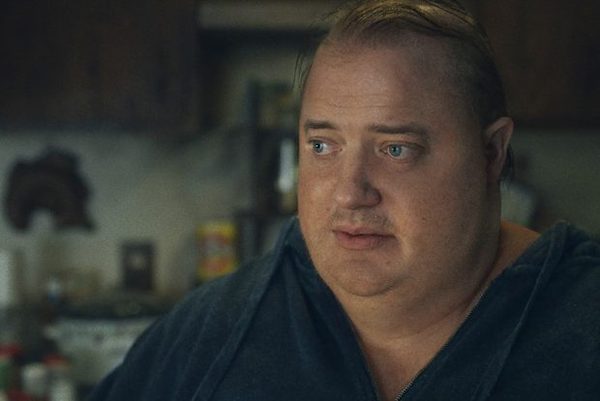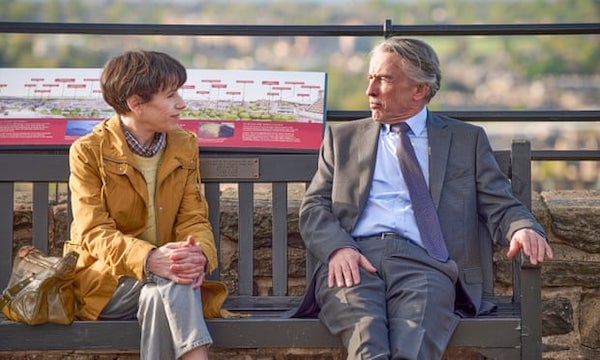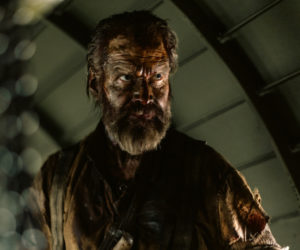At 2022 Toronto International Film Festival — “The Whale” and Two Excursions into History
By David D’Arcy
The Whale is a bracing two hour battle against destiny.

Brendan Fraser as the 600-pound man in The Whale.
One of the much-awaited films at TIFF was The Whale, directed by Darren Aronofsky and inspired by the play of the same title by Samuel D. Hunter, who wrote the screenplay. It is poignant, inescapably tactile, and intensely watchable for two hours.
For those who haven’t read about it, at the center of The Whale is Charlie (Brendan Fraser), a 600-pound middle-aged man who is isolated from the world, except for the college students to whom he teaches writing remotely, although he turns off the camera on himself. (Fraser wears a ‘fat’ suit in the film.) The only person allowed to enter his home is a devoted care-giver, plus the rare people who happen to knock on his door.
Then there are the people whom he wants back in his life — the daughter who thinks he abandoned her, and his ex-wife, whom he did abandon for a male lover, who’s now dead. There are plenty of reasons for Charlie to be miserable, although his food supply seems secure, too secure for his own good.
Call it dramatic honesty or caloric grotesquery (as we watch Charlie ingest pizza after pizza and more). This is the kind of character — vulnerable and irrepressible — that Aronofsky can get close to. And closeness is crucial to a film that is so much about isolation and the need for intimacy. The Whale takes place in an enclosed space, a house interior that feels as demarcated as a stage set, but the theater brings spectators only so close. The camera gets closer to Charlie here than would be possible in a theater. You’ve been warned.
How did he end up like this? After Charlie’s blood pressure hits a life-threatening number we are given his account of a troubled life, which means we get him wheezing and eating and barely able to stand as he looks back and talks and talks. There’s an old saying that more weight means more to love. In this case, there’s more to know – the collapse of Charlie’s family life, the death of his lover, and the imminent threat of his own demise. Fraser carries you through Charlie’s pleadings — in present and past tense — wallowing in emotions that are as raw and oversized as his character. Taking things to the edge is not simply a figure of speech. It’s this performance.
But The Whale, for all the attention that Fraser’s overwhelming portrait has gotten, is not a one-man show.
Hong Chau, playing Liz, a nurse and friend, is a foul-mouthed tough love advocate. Charlie’s last link to medical assistance, she voices all the frustrations that come with loving someone who refuses to love himself. Charlie’s daughter Ellie (Sadie Sink) is angry evidence of his failures as a parent. She listens impatiently to Charlie’s pleas for reconciliation with the bitter disbelief of a deserted child, accented by a wicked sense of the absurd. Samantha Morton is the ex-wife who has heard it all. And then there’s an odd side-drama with a born-again young man who keeps popping in until Charlie changes his visitor’s life in the way that he was unable to change anyone else’s.
Aronofsky has drawn fine performances from his cast, but the confined space and monomaniacal death bed conditions that drive the narrative are a limitation. The film’s succession of confessional confrontations — a huge man faces his life and death, again and again — becomes ritualistic, even belabored. And the director’s quasi-religious ending (no spoilers here) left this critic emotionally shortchanged. Miracles that resolve life’s messes tend to do that.
It is fitting that Charlie’s favorite book is Moby-Dick. The Whale is a bracing two hour battle against destiny.

Sally Hawkins and Steve Coogan in The Lost King.
Literature and the legacy of another classic poses a different problem in The Lost King. Directed by Stephen Frears, this comedy is based on a true story of archaeology and history.
Sally Hawkins plays Philippa Langley, a newly divorced amateur historian who has just been ousted from her day job. Undeterred, she’s out to challenge William Shakespeare and centuries of conventional wisdom to find evidence regarding the true history of King Richard III. If that weren’t enough, she wants to unearth his skeleton.
The clever, witty script by Steve Coogan and Jeff Pope (Coogan also plays Philippa’s weak-willed ex-husband) is inspired by Langley’s 2013 nonfiction book The King’s Grave. Scholars had suggested that Richard might have been buried where Philippa eventually digs.
The film serves up a series of David versus Goliath battles. Goliath is Philippa’s officious New Media boss or a smug administrator of the University of Leicester who smirks at the woman’s assertion that Richard (who was not afflicted by the famous hump) was entombed under a parking lot in Leicester, near the site of the Battle of Bosworth in 1485 where he was killed. The same university naysayers, when Philippa is proven right, try to hijack the discovery for marketing purposes. She blocks that. The finding of his bones overturned historical legend and its myths about a villainous, violent king. For the record, Leicester officials insist they were more cooperative than the film shows.
The Lost King has a conventional look – except for the apparition of the king (Harry Lloyd) following Philippa around that only she can see. And there are the often off-center Ricardians, admirers of the king (members of the Richard III Society) who help sustain Philippa’s gambit. They are a branch of English eccentricity (and serious scholarship) worth knowing about.
From the viewpoint of mainstream critics, The Lost King is the story a woman’s mid-life crisis, her rejuvenation caused by her challenging conventional historical wisdom, undercutting everyone from William Shakespeare to a committee of university bureaucrats. But that’s not what makes The Lost King so much fun. Frears and Coogan manage to make workplace injustice and arrogant academic politics as unappealing as Philippa’s home life, soured in part by the character that Coogan wrote for himself.
As it should be, your attention most of the time is on Sally Hawkins, who plays the intrepid Philippa as charming (as we might anticipate) – relentless, but not quixotic. What’s different here is that she does justice to a character who is relentless, but not quixotic. Hawkins’ reaction shots in meetings with superiors and officials who lecture her are striking portraits of an ordinary citizen’s distrust of the powerful.
It’s reassuring to see history corrected in The Lost King, especially at a time when mourning for Queen Elizabeth II blunts criticism of that monarch and the state that she headed for so long. The film also opens this fall in the wake of the departed Prime Minister Boris Johnson, who (even his supporters admitted) lied about whatever suited him.
It’s rare to recommend a heartwarming film with a happy ending. Just don’t think about all that other history that still needs correcting.

Jorma Tommila in Sisu.
The Lost King is likely to cross your path. So might Sisu, from Finland, a war saga that opens with the lonely feel of a western. Nazis troops are retreating from Russia in 1945. A solitary Finnish soldier, Aatami Korpi, is prospecting for gold in the empty northern reaches of his country, where an occasional plane passes overhead. Heading home with a full rucksack, he meets a convoy of desperate Nazis fleeing westward with women prisoners. Eager for his valuable stash, the Nazis try to kill Korpi. He survives; most of them don’t. Directed by Jalmari Helander, the showdown in the barren landscape is a bloody ‘can-you-top-this’ revenge fest, and an imaginative one given that there isn’t much to work with up in stark Finnish Lapland.
The Finnish word sisu means internal; in English it could roughly be translated as guts. There are versions of the film in English and Finnish, but this hyperbolic spectacle needs no subtitles.
Screen veteran Jorma Tommila plays the raging Korpi, who takes out after the Germans who failed to kill him. And the film packs a welcome surprise — an uprising from the women prisoners. Keep in mind, though, a fact that the film never tells you. Finland was allied with the Nazis against Russia in World War II until 1944.
David D’Arcy lives in New York. For years, he was a programmer for the Haifa International Film Festival in Israel. He writes about art for many publications, including the Art Newspaper. He produced and co-wrote the documentary Portrait of Wally (2012), about the fight over a Nazi-looted painting found at the Museum of Modern Art in Manhattan.
Tagged: Brendan Fraser, Darren Aronofsky, Jeff Pope, Jorma Tommila, Sally Hawkins, Sisu, Stephen Frears, Steve Coogan, The Lost King
